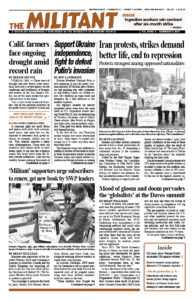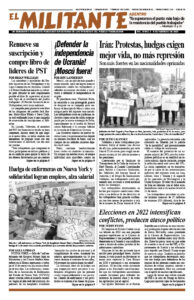Russian President Vladimir Putin is now preparing to turn his nearly yearlong invasion of Ukraine into a drawn-out and grinding war, with systematic air and artillery attacks on civilian targets. He’s building up troop levels and weaponry for a new offensive as the weather improves.
His regime’s assaults on heavily populated urban areas have the same smell as U.S. imperialist attacks during World War II, like the firebombing of Dresden, Germany, and of Tokyo. These attacks, like Putin’s in Dnipro and other cities, had no military objective. Their goal was death, destruction and demoralization.
In the face of this, the Ukrainian people remain ever more determined to resist. Putin hopes to exploit rifts among the U.S. rulers and their allies who back Kyiv.
The Kremlin’s army has suffered casualties in the tens of thousands in largely futile human-wave attacks in eastern Ukraine, using conscripted workers-in-uniform and former prisoners as cannon fodder. His goal remains to conquer all of Ukraine and its people.
Months of drone and missile attacks on Ukrainian cities targeting infrastructure and housing have choked production and left millions with sporadic heat and light in subzero temperatures. Not only has this failed to break the morale of Ukrainian working people, it has increased their resolve to defend their country’s independence.
The working class remains the backbone of the defense. Crews of maintenance workers and engineers work long hours in perilous conditions to restore power networks. Regarded as war heroes, at least 10 have died on the job since the barrages began in October.
“I closed my eyes [to it] and just got on with work,” Roman Horbatyuk, 39, told the Wall Street Journal. He became a target while repairing power lines.
“We are a battalion of electricians,” 64-year-old Volodymyr Ovdei told the paper. Some electrical workers have come out of retirement to replace the hundreds who have joined the armed forces.
At the same time, workers face attacks by bosses seeking to profit from the war, backed by the capitalist Zelensky government. Trolleybus drivers in Kharkiv face the lowest wages in the country, about 45 hryvnias ($1.22) per hour, a driver named Vitaliy wrote in an appeal for help to independent trade unions, journalists and international supporters Jan. 19.
“For many years, there have been problems with massive violations of safety regulations, labor legislation and wages in our companies,” he said. Drivers are forced to pay for trolleybus repairs at their own expense.
“Some drivers work 14 to 16 hours a day,” forced to ignore rules on rest and shifts to try to make up their pay with overtime, Vitaliy said. This is dangerous for drivers and passengers alike. They’re pressed to keep driving during air raids and artillery fire.
He says that despite the fact they are exempt from the draft as “critical infrastructure workers,” many drivers have volunteered to go to the front.
The country’s independent unions, organized in the Confederation of Free Trade Unions of Ukraine, continue to mobilize to provide aid to workers and soldiers who have come under attack. After miners and others in the city of Hirnyk in the Donetsk region, the home of Kurakhivska Mine, were hit by Russian artillery Jan. 14, the confederation brought aid to repair miners’ homes, the trade union office and other facilities, as well as delivered to area families. Similar aid trips have been made to mining towns across the country.
Russians demand ‘No to war!’
Thousands of Russian emigres in more than 60 cities around the world joined rallies Jan. 21 chanting “No to war” and “Freedom to political prisoners.” The protests were organized by supporters of Alexei Navalny, Putin’s most prominent bourgeois opponent, who was jailed two years ago. He and his political network have been denounced as “terrorist” by the Kremlin for exposing corruption and speaking out against the war in Ukraine.
In a series of open letters to Putin in the past two weeks, hundreds of Russian doctors, some 50 lawyers and the same number of politicians objected to Navalny’s confinement in isolation. They demanded he be given access to medical treatment.
Protesters held placards and waved the Ukrainian flag as well as the Russian flag with the red removed — an anti-war symbol there. There were also a number of solo protests inside Russia, where gatherings of demonstrators face arrest and jail under onerous wartime censorship laws.
“I came here because I don’t support the political regime in my country and I believe that the war needs to end,” Yulia told the Moscow Times at a rally of several hundred people in Belgrade, the Serbian capital.
In response to the Kremlin’s deadly Jan. 15 missile strike on an apartment complex in Dnipro that killed and injured scores, many Russian working people have found ways to honor the dead and protest the war. In Moscow, flowers and children’s toys are placed at the monument to the Ukrainian writer Lesya Ukrainka on Ukrainsky Boulevard. A photo of the destroyed housing block was also placed there. While police detained several people, including a passerby walking his dog, more floral tributes keep appearing.
Similar memorials have been put up at Ukrainian cultural sites in St. Petersburg and other cities. Police removed the tributes, sometimes making arrests. But the widespread protests have continued.
“Ukraine: not our enemies but our brothers,” was a sign held by Ekaterina Varenik, 26, a lawyer, in front of Ukrainka’s statue Jan. 21. She told the New York Times that Putin’s crackdown was getting “worse and worse, and stricter and stricter” every day. But she stood defiant for half an hour before she was arrested.

